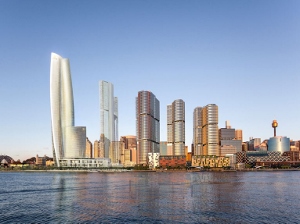Tourists warned to stay away from contaminated holiday haven
Toxic contamination has been found in the waters of a NSW tourism hotspot renowned for its pristine environment – just days before holidaymakers converge for the summer break.
Firefighting chemicals alleged to cause serious health issues have contaminated waterways around Jervis Bay on the NSW south coast, an area famed for its white sands and turquoise waters.
Signs went up weeks ago at creeks near popular holiday spots such as Hyams Beach and Green Patch warning people not to fish or eat seafood caught in the creeks because of possible PFAS contamination. Marys Creek has now been closed for human use.
People have been warned to avoid seafood from Flat Rock Creek which neighbours Hyams Beach, as well as Captain’s Lagoon and Summercloud Creek.
The pollution comes from fire-retardant foams, used for firefighting at two nearby military bases, which contain per- and poly-fluoroalkyl chemicals (PFAS) unable to be broken down in the environment.
Department of Defence testing released last week showed toxins had leached into waterways and spread via the sewer network.
Treated wastewater – still containing PFAS – was used to irrigate a local golf course and traces of contaminants were also found in Lake Windermere, which supplies drinking water to the Jervis Bay township, but at concentrations 40 times below safe guidelines.
The most serious pollution affects Marys Creek, with the two chemicals combined found at nearly ten times the safe level for recreational use. In Captain’s Lagoon, frequented by anglers and swimmers, the reading for the two chemicals was more than double the safe limit for a recreational waterway.
The Defence Department said there were no consistent links between PFAS and diseases such as cancer and that advice to limit exposure was given as a precaution.
But Brisbane-based environmental medicine expert Dr Andrew Jeremijenko warned high risk groups should be wary, pointing out to Fairfax Media that the German Human Biomonitoring Commission had found PFAS exposure was linked to decreased fertility and low birth weight in newborns.
“If I was taking my pregnant girlfriend or wife there I would be careful,” he told the Sydney Morning Herald.
“They are more at risk because you need a smaller dose to get the effect and there’s still a lot of unknowns.”
He said tourists that regularly holidayed at Jervis Bay should also be wary because the chemicals take years to leave the human body.
“Every year the more fish you eat, the more it builds up,” he said.
Resident Jack Hampton told Fairfax Media he was concerned about the health issues and had abandoned favoured fishing spots following revelations of the pollution.
“People have probably booked their campsite for this coming Christmas and I don’t know if it will have an impact … it probably scares people away a bit,” he said.
“I wouldn’t be coming here if I was on holidays, I would be going somewhere else.”
While Australia’s Department of Health has denied the chemicals cause health effects in humans, in the United States has determined evidence shows PFAS cause health problems including immune, hormonal and developmental issues and potentially cancer.

AccomNews is not affiliated with any government agency, body or political party. We are an independently owned, family-operated magazine.







